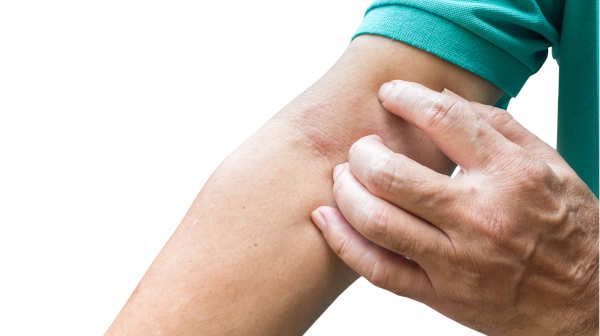Red, scaly patches on your skin can be embarrassing, and you might do your best to hide them when you’re out in public.
If you are living with these signs of psoriasis, however, you are far from alone. In the United States, about 8 million people have a form of psoriasis.
Psoriasis can cause significant discomfort, both physically and emotionally. It is more than just dry skin, and treating it is important to improve quality of life.
Read on to learn more about this condition, who is at risk, the complications, and how it is treated and prevented.
What is psoriasis?
Psoriasis is a hereditary skin condition that causes areas of the skin to shed rapidly. It can cause patches of raised skin or blisters on the scalp, elbows, knees, trunk or lower back. It is a chronic condition that can return multiple times. There are many kinds of psoriasis, with plaque psoriasis being the most common form.
Who is at risk?
People with a family history of psoriasis have a higher risk of developing it themselves. It can be triggered by stress or emotional disorders, or even by certain types of medication. Infections or skin injuries can also cause a flare-up.
What are the complications of psoriasis?
A common side effect of psoriasis is psoriatic arthritis, which affects between 10 and 30 percent of people with the condition. Psoriatic arthritis causes inflammation in the joints and may damage joints permanently. People with psoriasis also have a higher chance of developing diabetes, heart disease and other serious conditions.
How is psoriasis treated?
Various treatments can improve psoriasis symptoms. Topical treatments include steroid creams, vitamin A or vitamin D3 creams, and moisturizers. Medications are also available, though some are reserved for severe cases due to serious potential side effects. Ultraviolet light treatments can also reduce inflammation.
“Treatment for your psoriasis can vary as you age because your body may react differently to medications and your skin can change over time,” says Dan Bushnell, administrator at Gramercy Court Assisted Living. “If you begin to experience new side effects, or if treatments don’t work as well as they did in the past, be sure to talk to your doctor about other options.”
Can you prevent psoriasis?
Psoriasis is hereditary, and there is no way to prevent a person from developing the condition at some point. However, avoiding triggers like stress, sunburns and infections can keep flare-ups at bay. Caring for your skin can keep the condition under control. Use creams, lotions and humidifiers to keep your skin moist. Watch out for medications that increase your risk for a flare-up.
Psoriasis can have a major impact on your quality of life, especially if you are dealing with a severe case. While this condition can’t be cured, there are treatments to improve symptoms and reduce flare-ups. If you are experiencing psoriasis symptoms, work with your physician to find the right treatment to keep it from running your life.
A version of this article was published by The Daily Herald. It has been republished here with permission.




